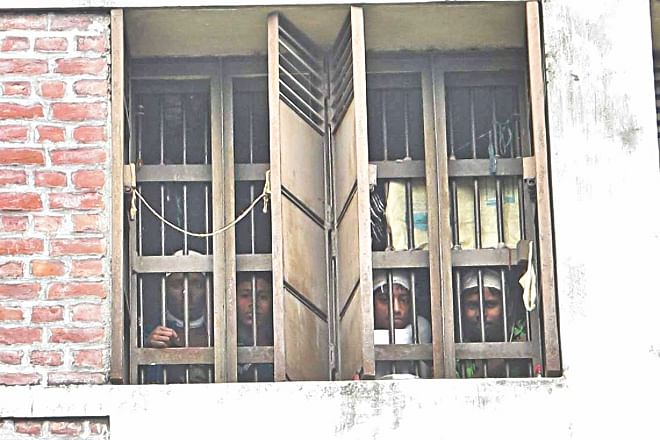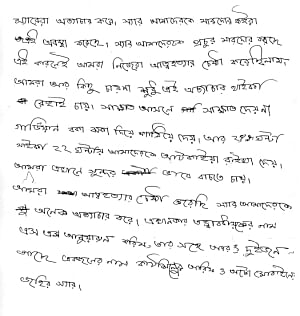Centre correct-none!
Centre correct-none!
Self-injury protest raises questions about juvenile correction home

Behind a perfectly manicured garden stands the juvenile correction centre in Tongi, whose inmates staged a horrific protest last week to bring to light the allegations of torture and abuse.
Hardly any journalists or human rights activists have been allowed in since 20 children gashed their arms, wrists and foreheads by shards of neon bulbs at the centre on the night of February 11.
Bandaged faces peered down through many of the windows of a five-storey building when a correspondent of The Daily Star was walking outside the boundary wall after failing to enter the premises.
"Our teachers abuse us all the time," reads a letter that was wrapped around a piece of soap and thrown at the correspondent.
"Some of us tried to commit suicide because they [teachers] abuse us. We just want relief from the torture and to lead a healthy life here."

The letter went on to say that in addition to the suspended superintendent, SM Anwarul Karim, their carpentry trainer Arif Mondol and automobile engineering teacher Zahir were also responsible for their situation.
"I often saw my son with bruised eyes and cheekbones. He told me that teachers had beaten him," said Jorina Begum, mother of a 14-year old. She came running to the centre after the authorities had informed her that her son was injured and in a "bad state".
In efforts to keep outsiders in the dark about the management, the overall environment, and the physical condition of those who had harmed themselves badly, the Gazipur Juvenile Development Centre has not been letting anyone in except for children's guardians.
Three hundred and eighty children, including convicts, are living in the centre that has the capacity to house 200.
The juveniles whose cases are on trial are kept there with the convicts for 22 hours of the day, as claimed in the letter.
Sixteen of the last week's protesters are not yet convicted. They are facing trial.
"International conventions do not allow keeping convicts and children on trial at one place," said Quazi Riazul Haque, chairperson of the children's rights committee of National Human Rights Commission.
Many of the inmates are violent and are often locked in vicious fighting, said people in the neighbourhood who see this all through the windows of the dormitories.
"If the children are violent then it must be investigated if the counsellors [at the centre] are doing their job properly," said former inspector general of police M Enamul Hoque who had dealt extensively with juvenile crimes.
Five counsellors are employed at the centre to look after the mental well-being of the children.
Asiya, the mother of Rajib, 14, said she had once seen her son with bandaged arms and forehead. When asked, Rajib told her that older boys had beaten him up.
Besides, drug addiction is rampant at the centre, said Aminul Islam, a programme manager of child rights organisation Aparajeyo Bangladesh. He had worked on a project at the centre in 2009.
"Of the current inmates, 45 have been held under the Narcotics Control Act," said Nasima Begum, secretary of the social welfare ministry.
There is no facility inside the correction centre for drug rehabilitation.
When asked why, Ayub Hossain, director general of the social welfare department, claimed the centre did not have any drug addict.
Azhar Ali Miah, deputy director of the Gazipur social welfare department, said, "They [children] do not have access to drugs at the centre. How can there be any drug addict?"
Requesting anonymity, police sources, however, told The Daily Star that the children were given small amounts of drugs they had been addicted to to keep them from becoming violent.
All these issues, however, appear insignificant to the children whose daily basic needs are not well taken care of.
"My child slept on the floor throughout this winter without any pillow and blanket," lamented Jahanara who came to visit her son.
The process of obtaining food and other resources often takes a long time as it gets caught up in bureaucratic tangles, said Aminul, the programme manager of Aparajeyo Bangladesh.
Children do not get enough soap for proper hygiene, their toilets are often overflowing and there is often very little food, said Mohammad Anisur Rahman Bhuiyan Firoze, convenor of the Gazipur office of Bangladesh Manabadhikar Council. He had worked with the juveniles for a long time.
"I have even found cases when parents brought food and money for their children, but the authorities kept those for themselves," he added.
Azhar, social welfare deputy director in Gazipur, refuted the allegation. He said the children were allowed to step out to meet their guardians so they could hand the gifts themselves.
Mohammad Joynal Abdul Maisbhandari, who came to see his son, said how he had once been locked in a balcony, and the goods he had brought were confiscated by the authorities.
Mohammad Ali Asgar, whose younger brother is an inmate, shared a similar experience. "They tore my shirt and lungi, beat me up and took away the food I brought."